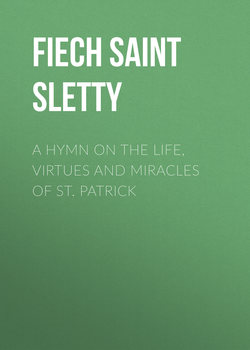Читать книгу A Hymn on the Life, Virtues and Miracles of St. Patrick - Fiech Saint Bishop of Sletty - Страница 1
SAINT FIECH, BISHOP OF SLETTY
ОглавлениеAs this specimen of the language spoken in Ireland about 1200 years ago, is here published, not only for the elucidation of our apostle's history, but also for the gratification of the lovers of Irish literature in general; the Irish original is accompanied, on the opposite page, with an English translation of the whole.
In this translation, the literal meaning, and idiomatic expression of the words and phrases, are adhered to in all such stanzas as the editor (with the aid of some members of the Gaelic Society, particularly conversant with subjects of this sort) could fully understand: for he acknowledges that neither he nor these gentlemen are so vain or disingenuous as to pretend that they comprehend the whole of this very ancient composition.
In order to obviate any objection which may be made against the passages in which the editor differs from the author of the version of this hymn, in Colgan's collection of our patron saint's lives, the Latin translation adopted in his edition, is also subjoined to the poem, at the bottom of each page.
To the hymn are added some short notes, illustrative of the subject.
Vindication of St. Fiech's Hymn, in Answer to Dr. Ledwich's Objections
Respecting the authenticity and antiquity of this curious specimen of our language about the commencement of the sixth century, some doubts were entertained by the sagacious Bollandists, who, consequently, considered St. Fiech to have lived long after our saint's time. This opinion, those learned Jesuits founded on Fiech's referring to other histories for the truth of what he relates with regard to his master, St. Patrick, during the first sixty years of his life previously to his arrival on the mission of Ireland.
This plausible objection has been adopted and urged by Dr. Ledwich, against St. Patrick's existence, with that dogmatical tone of magisterial positiveness so conspicuous in his volume of invectives against the ancient splendour, sanctity, and literature of his native country, declaring that Fiech and Sedulius's poems on our saint "are the wretched productions of some cloistered ecclesiastic."
To this, the only remaining one of these formidable objections, adduced by the doctor against our apostle's existence, we answer, that Fiech lived and composed this hymn some time after St. Patrick's death, in the 120th year of his age, and 60th of his apostleship. Now supposing Fiech to have lived to the 84th year of his age, and to have composed this hymn in 600, seven years after his master's death, which he so circumstantially relates in the poem; Fiech must consequently have been no more than about 17 years of age when our saint commenced his mission here. Where, or whence, then, except by divine revelation, or from St. Patrick himself, or from the revelation of others, could his disciple derive his information with respect to St. Patrick's parents and ancestors, who lived in a foreign country? or sacred Tours, in Gaul, the place of our saint s nativity? or his original name Succoth? or his voyages and travels by sea and land, after his escape from servitude in Ireland? or his insular retreats or studies under the spiritual guidance of St. German of Auxerre? &c, &c. &c.
Now, Fiech very justly informs his readers, that all these transactions, wrought before he was born, and in a foreign country, during the first 60 years of his great master's life, were ascertained in skelaiv, (STORIES,) as in the first stanza; or Fiadhaid, testified to us, as he says in the sixth stanza of his poem, the only two places were Fiech appeals to others for the foreign actions performed in the early period of St. Patrick's life: of whom, though there were many lives written and published during his existence, yet it is uncertain whether Fiech obtained his account from written or oral documents, for either may be denoted by the Irish word Scealaw (stories.) The term by which the translator of this hymn into Latin has rendered it, may also denote either oral or written information. In English, too, the word history often imports oral narration: thus Pope says:
"What histories of toil could I declare,
But still, long-wearied nature wants repair."
